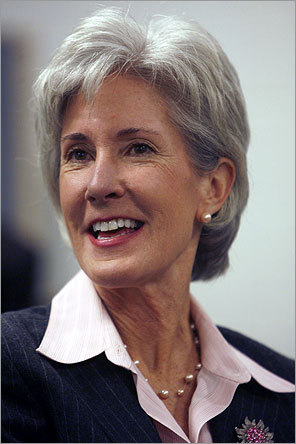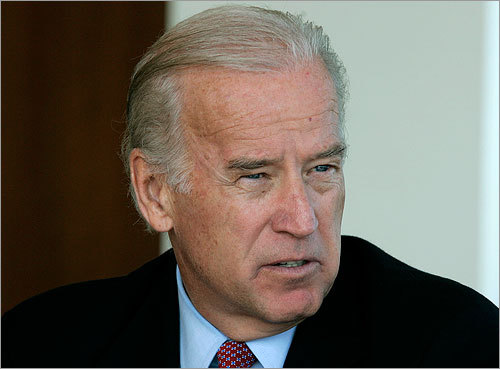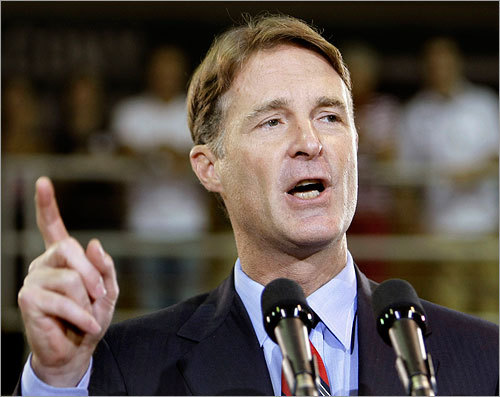If you've got nothing better to do than follow the day to day swings of the presidential election, you know that Obama is likely to announce his running mate tomorrow or Friday morning. Right now the leading contenders are said to be Evan Bayh (Indiana Senator), Joe Biden (Delaware Senator), Tim Kaine (Virginia governor) and Kathleen Sebelius (Kansas Governor). The inevitable whispers of Hilary Clinton are also out there, but they don't seem very likely - sources say she hasn't been vetted by the Obama team, and after reading about her inner circle in the
Atlantic article its hard to believe we wouldn't have heard. In any case, here is my take on the four most oft-mentioned candidates.
Kathleen Sebelius

As a national co-chair of his presidential campaign, Kathleen Sebelius has earned Obama's trust and gratitude. She reminds me of Mark Warner; she is extremely popular in a deeply conservative state in spite of holding several liberal positions (pro choice, especially). Her selection, however, is not going to deliver Kansas and may come across as gimmicky. Fair or not, I think it would come across as appeasement of Hillary's supporters. Rather than uniting the party, I think divisions would be reinforced, not forgotten about. Could she be one of the biggest losers of the drawn out primary?
Tim Kaine

I'm not high at all on the Virginia governor. His light resume (Richmond City Council - ooooh, Lt. Governor, Governor) does not bring the right tone to the ticket. He's described as a rising star in the Democratic party, but I don't think any serious pundits can actually mean that. What's his signature accomplishment? Enacting hugely unpopular Abusive Driver Fees? He has no bona fides on either the economy or defense (or anything, really), and frankly, he just doesn't look good on camera. He rode Mark Warner's coattails to power in Virginia, and doesn't bring a single thing to the ticket. I'm sure that the Obama campaign is too intelligent to give him the nod, leading us to...
Joe Biden

Look at that mug! There is the seasoned vet we need. He's not afraid to be aggressive, he's an experienced and competent attack dog, and he brings all the gravitas that Kaine lacks. A senator for decades, he's got foreign policy experience coming out his ass - just witness his most recent trip (and harsh words for Russia) to Georgia! It's not surprising that he's got the most buzz right now. Are there any problems with this selection? As far as I can see, there's just one, but its major. Presidential elections for the last several decades have revolved around one of two issues: the economy and defense. Remember Clinton's "It's the economy, stupid." Remember evil doers, 9/11, and the last eight years? If Democrats can make this election about the economy, they look good. The problem with Biden is that his selection cedes the field to McCain - rather than pushing an aggressive economic message, this pick is defensive. Obama already loses the national security vote and his selection should change the playing field, not play D in a losing battle.
Evan Bayh

I can't find anything interesting to say about Evan Bayh. He's a boring speaker. He's a boring senator from a boring state. He's on the Banking and Housing/Urban Development committees, so he supposedly brings economic experience to the campaign. Unfortunately, however, it doesn't seem like he can deliver Indiana (unless Gary puts him over the top!) If he's the best 'economic message' veep candidate we can find, I'm somewhat depressed for the Democratic party. That being said, of the four most hyped options, he seems like the best to me.
Everyone Else
There are two candidates who are leaps and bounds ahead of these four, and who, unfortunately, will not be picked. The first is John Edwards. As much as I didn't love him as a presidential candidate, as much as I think he comes across as phony and insincere (the haircut, the house, the mistress, the lies), and as much as he is political poison at this point, he is a candidate driven by an economic message. The point is moot now, but before the cheating scandal, ask the average voter about John Edwards and the first thing that comes to mind is "Two Americas." That's the kind of powerful, visceral economic message we need in a vice-presidential candidate. His selection would have set the tone for the entire presidential campaign, but unfortunately thats just a fantasy at this point.
The ultimate, game-over, plan the party selection would be Mark Warner. The former Virginia governor (and soon to be freshman senator) is the best and most effective Democratic politician I've ever witnessed. He's like an authentic Mitt Romney (and if you know me, you know how I feel about my neighbor, Mitt). Warner worked for telecom regulators after law school, went on to make a fortune (on the up and up) founding Nextel, and won the Virginia Governorship. His term (limited) first term was, again, Mitt-esque. He inherited a financial crisis and was forced to renege on a campaign pledge not to raise taxes. Unfortunately, this was the death knell of his political career, as he was labeled a tax and spend governor who was out of touch with normal people, and run out of office with Bush-like approval numbers... Wait a second, that wasn't Mark Warner, it was every single other Democratic politician in the world. What actually happened is that he rescued VA from its financial crisis, got it named the best managed state in the country, left office with approval ratings in the 80s (!), and flipped two senate seats and a governorship from red to blue. As veep, he delivers Virginia, no question, and puts us in line for 16 years in the white house. Current Washington rumor has it that he's cured cancer as well, but doesn't want to politicize it by announcing this development before his current senate race is over. Unfortunately, he took a pledge not to accept the VP nod and continue serving the people of Virginia. I believe that Mark Warner will be president one day, the sooner the better!
So I got a little off track with my Warner excitement. Now I'm depressed thinking about these VP possibilities. If I had to pick one, go with Bayh for the economic message. If you want to play defense on national security take Biden. Or you could go crazy and pick Hillary for a "Unity Ticket." We'll find out tomorrow (or Friday).










